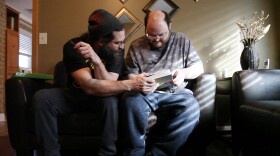The University of Rochester Medical Center’s neuroscience laboratory has received a $6 million grant from the National Institutes of Health to study intellectual and developmental disorders.
URMC’s Del Monte Neuroscience Institute is one of 14 institutions in the country to receive the grant and be named an Intellectual and Developmental Disabilities Research Center by the NIH.
The director of URMC’s institute, John Foxe, said the grant will fund research into common developmental disorders, like autism, and much rarer conditions like Batten disease, which occurs in only about three of every 100,000 births.
Foxe said studying uncommon diseases can unlock clues to diagnosing and treating a wide array of other conditions.
“I often get asked, ‘Well, why are you studying this rare disease? There’s only 50 or 60 children in the country that we can identify with this rare disease.’ ” Foxe said. “But oftentimes in the understanding of the biology of one of these diseases, you gain insights into all of them at the same time.”
Laurie Chapman’s son, who was diagnosed with autism at 2 years old, has been enrolling in research projects at URMC for years, she said.
With those projects set to expand under federal grant funding, Chapman said she hopes more families will participate.
“They make it fun. They make it enjoyable,” Chapman said of the researchers. “They listen to the kids; they’re playing games with the kids. It’s just a great time.”
At Rochester’s Center for Disability Rights, advocacy director Gregg Beratan cautioned the researchers. “There is a long history of nondisabled people doing research on disabled people while giving little thought to what research is actually wanted and needed by the Disability Community,” he said via email.
Foxe said people with disabilities, as well as their representatives, parents and advocates, sit on the research center’s advisory board. The researchers subscribe to a basic idea of disability rights, he said: “Nothing about me without me.”
Still, Beratan said, the list of board members provided by URMC tips heavily toward parents and advocates of people with disabilities, not the people who have disabilities themselves.
“While there are many wonderful parents out there, there is also a history of parents speaking in place of their disabled offspring as if they could speak for them,” Beratan said.

This story is part of Move to Include, a public media initiative supported by the Corporation for Public Broadcasting, a private corporation funded by the American people. Additional funding provided by the Golisano Foundation.





